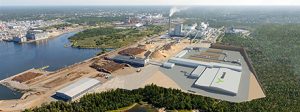Metsä has agreed on the main equipment purchases for its new sawmill in Rauma and the planned bioproduct mill in Kemi. The total value of the agreements is approximately EUR 500 million and their degree of Finnish content 70%. Source: Timberbiz
In the northern spring of 2019, Metsä Group started the pre-engineering for investments totalling roughly EUR 2 billion, including the Rauma sawmill, Kemi bioproduct mill and the first phase of the modernisation of the Husum pulp mill in Sweden.
“The implementation of the Rauma sawmill investment, which was decided in late March, has progressed well, as has the planning of the Kemi and Husum projects.
“In the current situation, impacted by the coronavirus pandemic, we need investments to maintain society’s cash flows and well-being. I’m happy that we were able to achieve a large number of competitive equipment deals with companies that have strong operations in Finland. Our investment projects create well-being on many levels in Finland,” Ilkka Hämälä, President and CEO of Metsä Group said.
Construction of the Rauma sawmill begins this month.
Rauma’s sawline will run at a speed of more than 200 metres per minute. The speed on all processing and sorting lines is more than 200 pieces per minute. All load transfers in the drying area will be fully automated.
Production at the world’s most modern sawmill in Rauma is meant to start up during the third quarter of 2022. The coronavirus outbreak, however, may have an impact on the schedules.
The new unit’s annual production is some 750,000 cubic metres of pine sawn timber, and it will be a global forerunner in terms of its technology and efficiency. For example, using machine vision and artificial intelligence in different stages of the sawing process is a significant new development. Similar technology is not yet in use anywhere in the sawmill industry.
The new sawmill will employ around 100 people directly in Finland and around 500 people across its direct value chain.
Sawn timber produced by the Rauma sawmill will be sold mainly to Europe and Asia.
The Kemi bioproduct mill is expected to be commissioned late in 2020, as the environmental permit process is completed.
The new bioproduct mill will operate below the emission limits specified in the environmental permit of Kemi’s current pulp mill, despite increasing production. The bioproduct mill will produce some 1.5 million tonnes of softwood and hardwood pulp annually as well as numerous other bioproducts and employ around 250 people directly in Finland and a total of approximately 2500 people across its direct value chain.
The mill’s annual use of pulpwood, purchased mainly from Finland, would amount to roughly 7.6 million cubic metres.
The mill will not use any fossil fuels, and its electricity self-sufficiency will be 250%. This will strengthen the significant position of Metsä as an electricity producer based on Finnish renewable fuels.






